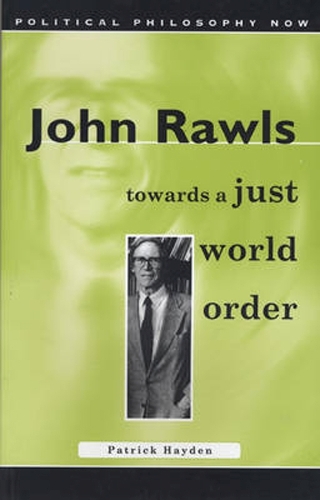
John Rawls: Towards a Just World Order
(Paperback)
Publishing Details
John Rawls: Towards a Just World Order
By (Author) Patrick Hayden
University of Wales Press
University of Wales Press
7th August 2002
United Kingdom
Classifications
Tertiary Education
Non Fiction
International relations
International law
320.01
Physical Properties
Paperback
224
Width 138mm, Height 216mm
308g
Description
John Rawls: Towards a Just World Order is a concise and detailed analysis of one of the foremost political philosophers of our time that demonstrates the importance of Rawls's work for contemporary debates regarding international relations, world politics and human rights. Since the publication of A Theory of Justice (1971), John Rawls has been viewed as one of the most important political theorists of the twentieth century. In John Rawls: Towards a Just World Order, Patrick Hayden discusses Rawls's views regarding the nature of social justice among states. He examines Rawls's most important writings in order to assess how adequately his theory of justice is able to accommodate claims to universal human rights and shows how Rawls's work can contribute to the construction of a cosmopolitan approach to issues of international justice. Beginning with Rawls's attempt to develop an account of international justice and human rights that is consistent with his earlier theory of justice as fairness, Hayden then offers a critical examination of Rawls's political philosophy and international thought which argues for a cosmopolitan variation on Rawls's 'law of peoples'.
Reviews
' ... clear and thorough in reviewing the development of Rawls's thinking ... International Relations specialists should read this book as a vigorous defence of cosmopolitanism.' (Canadian Journal of Political Science Vol. 36 No. 3). ' ... It makes a significant contribution to debates concerning universal human rights and will be very useful to those with an interest in either international justice or Rawl's views.' (Choice) ' ...an important critique of Rawls's statism... ' (Cambridge Review of International Affairs)
Author Bio
Patrick Hayden is Assistant Professor of Philosophy and Director of Peace and Justice Studies at New England College. He has written on a wide range of topics in philosophy and political philosophy, is the author of Multiplicity and Becoming: The Pluralist Empiricism of Gilles Deleuze (1998) and the editor of Philosophical Perspectives on Law and Politics (1999) and The Philosophy of Human Rights.
